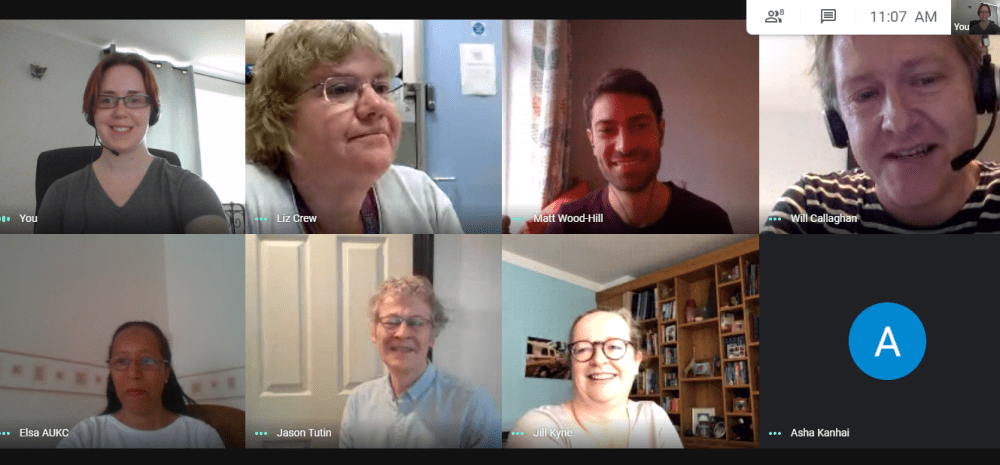Leeds and Croydon are creating a digital inclusion toolkit
Leeds and Croydon Councils recently won central government funding to create a comprehensive and collaborative how-to guide for digital inclusion.

Earlier this month, Leeds City Council and Croydon Croydon kicked off the first sprint in our joint project to create a collaborative digital inclusion toolkit. The project is funded by MHCLG as part of the Local Digital COVID-19 Challenge, and will be delivered in partnership with AgeUK Croydon and the Eastbourne-based not for profit TechResort.
Leeds has a proven track record of delivering successful digital inclusion initiatives with the 100% Digital Leeds programme, and put forward a bid to share this experience in the form of a guide or toolkit to assist other councils wishing to set up and manage digital inclusion projects.
Croydon Council was keen to test and develop new digital inclusion initiatives, including equipment lending and skills training, and to publish this learning in the form of a collaborative playbook. Together, the bids made an excellent fit for a joint project.
As we get started, here’s a summary of what we plan to achieve in the coming weeks.
What we’re thinking about
Increasing digital inclusion plays a key part in ensuring that people who may be vulnerable and socially isolated are not further disadvantaged by the restrictions imposed by the coronavirus pandemic.
This toolkit aims to draw on the combined experience and learning of Leeds and Croydon councils to produce a comprehensive guide on methods for tackling digital exclusion, and also to create a collaborative platform where other councils and organisations can feed in their own experience and content.
So far, the team has begun outlining our success criteria for the project, with some refining still to do over the next sprint.
Initial problem statement: “How can we create a single authoritative source of digital inclusion information that anyone can add to?”
Our current project goals as are follows:
- publish the content we already have
- make the content easy to follow
- find the gaps and fill them
- provide basic commenting tools
What we’ve been doing
- getting to know each other – the run up to Sprint 1 was spent establishing communications channels and getting to know the project team
- getting used to agile – we spent some time going over the principles of agile project management to ensure everyone was comfortable with this way of working
- setting some goals – the first review meeting has been held, during which we set some Sprint 1 goals and established tasks around better defining the project
What’s next?
One of the first tasks is to better define the nature of the toolkit, in terms of content, structure, and platform.
Content development
Initially we’ll be coming up with a starter outline for what chapters to include in the toolkit. This will need to cover everything we consider to be essential content for the final product. It will draw on things learned over the course of the development and delivery of the 100% Digital Leeds programme. Defining the chapters we want to include will help us to identify any gaps in our understanding which we can go on to fill via research and discovery later in the project.
Current questions to answer:
- What are some common technical questions asked by our audiences?
- What devices and products does the project team already have experience with?
- How effective are some of the 100% Digital Leeds approaches when trialled in another part of the country?
Product development
Work is already underway in searching for an appropriate platform to host the content. A suitable platform must present our content in an easy to navigate, accessible format. This project is also intended to be collaborative, with the ability for other councils and organisations to comment, ask questions and make additions to the content. We are in the process of identifying options to trial, and beginning to consider how external contributions to the site might function in terms of moderation and keeping the content streamlined.
Current questions to answer:
- What platform options are available and how well do they suit our needs?
- How can we make the final product collaborative, while also maintaining the quality and accessibility of the content?
Once a more concrete idea of what the final product should be is in place we can begin the process of creating and sourcing content, and also move forward with planning what research and testing work needs to be done.
We will be publishing updates at 100% Digital Leeds over the next couple of months, with highlights here. If you’ve any thoughts or questions please do post them.


1 thought on “Leeds and Croydon are creating a digital inclusion toolkit”
This is an amazing project. Congratulations and thanks for thinking how you can spread your knowledge and success to other areas. I am really keen to help in any way I can, contribute my ideas and challenges and hear how you‘re getting on. Good luck!